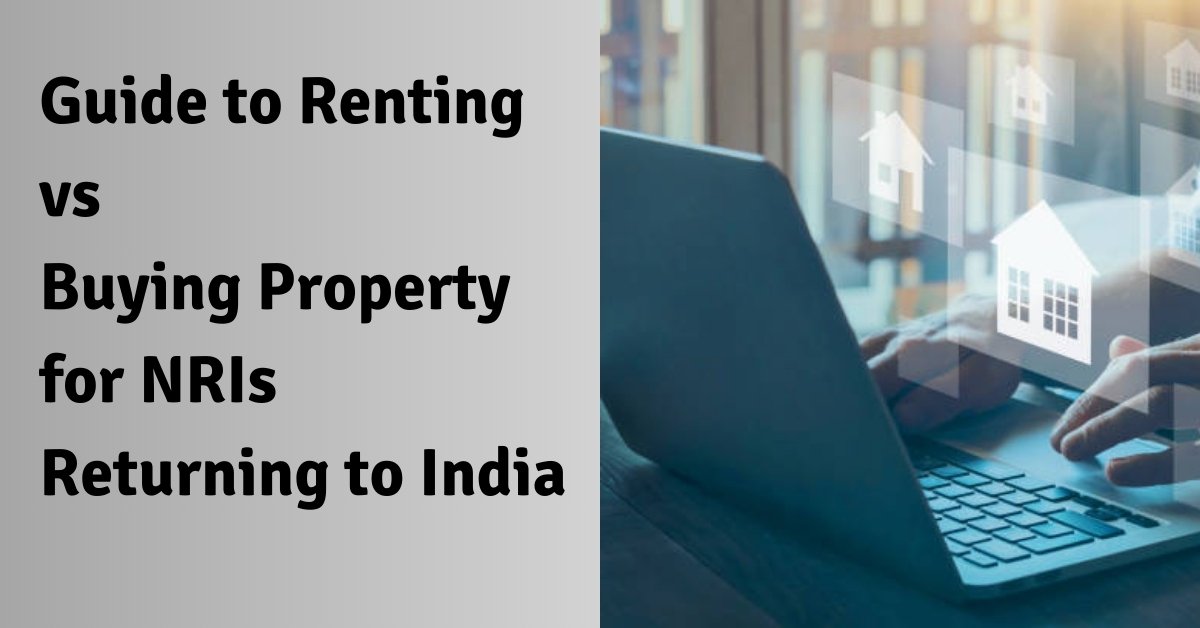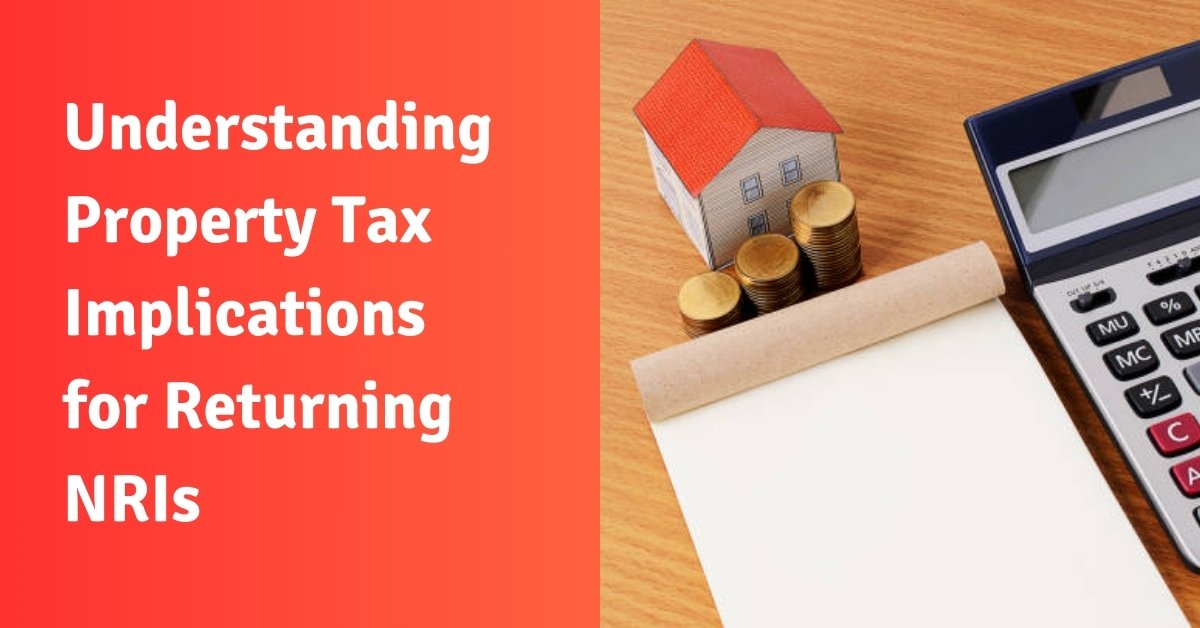Real Estate Vs. Stock Market: Where Should Returning NRIs Invest?
As a Non-Resident Indian (NRI) planning to return to India, you may be contemplating the best investment avenues to maximize your wealth and secure your financial future. Two of the most popular investment options in India are real estate and the stock market. Both have their own unique characteristics, advantages, and drawbacks. In this blog post, we will delve into the key considerations and factors to help you decide whether real estate or the stock market is the more suitable investment choice for you as a returning NRI. Real Estate: Real estate has traditionally been a favored investment option for NRIs due to its tangible nature and potential for long-term appreciation. Here are some advantages of investing in real estate: a) Stability: Real estate investments are generally considered more stable compared to the stock market, as property prices tend to be less volatile. b) Regular Income: Rental income from properties can provide a steady cash flow and supplement your regular income. c) Leverage: You can use borrowed funds to purchase real estate, enabling you to invest in higher-value properties with a smaller initial investment. d) Tax Benefits: Depending on the nature of the property and your usage, you may be eligible for various tax deductions and exemptions. However, real estate investments also come with certain drawbacks: a) liquidity: Real estate investments are relatively illiquid, as selling a property can be time-consuming and may involve significant transaction costs. b) Management Overhead: Owning and managing properties requires time, effort, and expertise. You may need to deal with tenants, maintenance issues, and legal complexities. c) Concentration Risk: Investing a large portion of your wealth in a single property or location exposes you to concentration risk if the market experiences a downturn. Stock Market: The stock market offers an alternative investment avenue with the potential for higher returns. Here are some advantages of investing in the stock market: a) Liquidity: Stocks can be easily bought and sold on stock exchanges, providing higher liquidity compared to real estate investments. b) Diversification: The stock market allows you to diversify your portfolio across different sectors, companies, and even geographical regions, reducing overall risk. c) Professional Management: By investing in mutual funds or availing portfolio management services, you can benefit from the expertise of professional fund managers. d) Potential for High Returns: Historically, the stock market has delivered higher returns compared to many other asset classes over the long term. However, investing in the stock market also comes with certain risks and challenges: a) Volatility: Stock prices can be highly volatile in the short term, influenced by various market and economic factors. b) Market Risk: The stock market is susceptible to systematic risks such as economic downturns, political uncertainties, and global events. c) Knowledge and Expertise: Investing in individual stocks requires thorough research, financial knowledge, and the ability to analyze market trends and company fundamentals. Factors to Consider: When deciding between real estate and the stock market, consider the following factors: Diversification is Key Rather than choosing between real estate and the stock market, consider diversifying your investment portfolio across both asset classes. Diversification helps spread risk and potentially enhances overall returns. As a returning NRI, you can allocate a portion of your wealth to real estate for stability and regular income, while investing another portion in the stock market for potential capital appreciation and liquidity. Seek Professional Advice Navigating the Indian investment landscape as a returning NRI can be complex, considering the various regulations, tax implications, and market dynamics. It is highly recommended to seek the guidance of a qualified financial advisor or investment professional who specializes in NRI investments. They can help you assess your risk profile, investment goals, and provide personalized recommendations based on your specific circumstances. Disclaimer: The information provided here is for educational and informational purposes only and should not be construed as financial, legal, or tax advice. Consult with a qualified professional before making any investment decisions. We do not accept any liability for errors or omissions in this information nor any direct, indirect, or consequential losses arising from its use.
How to Transfer Property Ownership from NRI to Resident Status?
Are you an NRI who’s planning to move back to India? If you own property in India, you might need to change your property ownership from NRI to resident status. This process can seem confusing, but don’t worry! We’re here to help you understand the steps involved and make the transition smoother. Understanding NRI and Resident Status First, let’s clarify what NRI and resident status mean. An NRI (Non-Resident Indian) is someone who lives outside India for work or other reasons. When you come back to India to live permanently, your status changes to resident. This change affects how you handle your property and finances in India. Why Change Property Ownership Status? When you become a resident, it’s important to update your property ownership status. This helps you follow the rules set by the Reserve Bank of India (RBI), make sure your taxes are correct, and manage your property and money more easily. Steps to Transfer Property Ownership Now, let’s look at the steps you need to follow to change your property ownership from NRI to resident status: 1. Inform the Bank If you have a home loan or a bank account related to your property, tell your bank about your change in status. You’ll need to provide proof that you’re now living in India permanently. This could be your visa, passport stamps, or a letter from your employer in India. 2. Update Your NRE/NRO Accounts As an NRI, you might have NRE (Non-Resident External) or NRO (Non-Resident Ordinary) bank accounts. When you become a resident, you need to change these. NRE accounts should be changed to resident accounts. NRO accounts can stay as they are, but tell the bank about your new resident status. 3. Property Documents Update You’ll need to update the property documents to show your new resident status. This includes the sale deed, property tax records, and utility bills (like electricity and water). Visit the local municipal office or property registration office to make these changes. They’ll guide you through the process and tell you what papers you need. 4. Tax Considerations Your tax situation will change when you become a resident. You’ll now pay tax on your global income in India. The way rental income from your property is taxed might change. Capital gains tax rules might be different if you sell the property. It’s a good idea to talk to a tax expert to understand how these changes affect you. 5. FEMA Compliance The Foreign Exchange Management Act (FEMA) has rules about property owned by NRIs. When you become a resident, some of these rules change. Make sure you understand and follow the new rules that apply to you as a resident. 6. Inform Housing Society If your property is part of a housing society or apartment complex, let them know about your change in status. They might need to update their records. 7. Update Insurance Policies If you have insurance on your property, inform the insurance company about your new resident status. They might need to update their records or change your policy. 8. Power of Attorney If you had given someone power of attorney to manage your property while you were an NRI, review this arrangement. You might want to cancel or change it now that you’re back in India. Common Challenges and How to Handle Them Government offices can be slow, leading to paperwork delays. Be patient and keep following up. Having all your documents ready can help speed things up. Tax rules can be confusing, so don’t hesitate to ask for help from a tax expert who knows about NRI issues. Some banks might take time to process your account status change. Start this process early and keep in touch with your bank. If there are any ongoing issues with your property, becoming a resident might affect how these are handled. Consult a lawyer if you’re dealing with any property disputes. Tips for a Smooth Transition Start the process of changing your status as soon as you decide to return to India permanently. Organize all your property-related documents. This will make the process easier. Consider hiring a lawyer or property consultant who specializes in NRI property matters. Keep up with any new rules or laws that might affect NRI property ownership. When dealing with banks, government offices, or other authorities, explain your situation clearly and provide all necessary information. Conclusion- Changing your property ownership from NRI to resident status involves several steps, but it’s an important process when you return to India. By following these steps and being prepared, you can make the transition smoother. Remember, it’s always a good idea to consult with experts like lawyers, tax advisors, and property consultants to ensure you’re following all the rules correctly. Welcome back to India! With your property ownership properly updated, you can fully enjoy your return to your home country. Disclaimer: The information provided here is for educational and informational purposes only and should not be construed as financial, legal, or tax advice. Consult with a qualified professional before making any investment decisions. We do not accept any liability for errors or omissions in this information nor any direct, indirect, or consequential losses arising from its use. FAQs: Transferring Property Ownership from NRI to Resident Status 1. Do I need to transfer my property ownership when I return to India permanently? Answer – While it’s not mandatory to transfer ownership, updating your status is important for compliance with RBI regulations and proper tax management. It’s recommended to inform relevant authorities about your change in residential status. 2. How long does the process of transferring property ownership take? Answer – The timeline can vary depending on various factors, but typically it takes 2-3 months. Be prepared for potential delays due to bureaucratic processes. 3. Will I need to pay any fees or taxes for transferring my property ownership? Answer – There are usually no direct fees for changing your status. However, you may need to pay for document updates or
Guide to Renting Vs Buying Property for NRIs Returning to India
As a Non-Resident Indian (NRI) planning to return to India, one of the most important decisions you’ll face is whether to rent or buy a property. Both options have their own advantages and disadvantages, and the right choice depends on your unique circumstances, financial goals, and long-term plans. In this blog post, we’ll explore the key factors to consider when deciding between renting and buying property as an NRI returning to India. Renting a Property In India Renting a property can be an attractive option for NRIs who are unsure about their long-term plans or are not ready to make a significant financial commitment. Renting allows for greater flexibility, as you can easily move to a different location if your job or personal circumstances change without being tied down to a particular property or location. Additionally, renting involves lower upfront costs, as you typically only need to pay a security deposit and a few months’ rent in advance, which is significantly less than the down payment required when buying a property. As a tenant, you also have fewer responsibilities, as the landlord is responsible for property maintenance, repairs, and taxes, giving you more freedom and less stress. However, there are also some disadvantages to renting. When you rent, you are not building any equity in the property, and your monthly payments go towards the landlord’s mortgage instead of your own. You may also face a lack of control over your living space, as you are subject to the landlord’s rules and decisions and may not be able to make changes to the property. Furthermore, landlords can increase the rent when your lease is up for renewal, which can impact your budget and long-term financial planning. Buying a Property In India On the other hand, buying a property can be a wise investment for NRIs who are confident about their long-term plans and have the financial means to do so. When you buy a property, you are building equity with each mortgage payment, which can be a significant source of wealth creation over time. As a homeowner, you have complete control over your property and can make changes, renovations, and decorations as you see fit. Additionally, if you decide to move or return abroad, you can rent out your property and generate passive income. However, buying a property also comes with some disadvantages. Buying requires a significant upfront investment, including a down payment, closing costs, and potential renovations. It is also a long-term commitment to a particular location, which can be challenging if your job or personal circumstances change. As a homeowner, you are responsible for all property maintenance, repairs, and taxes, which can be costly and time-consuming. Renting vs. Buying: Key Considerations for NRIs Duration of Stay: Renting is practical for short stays (less than 3-5 years), while buying is better for long-term stays. Financial Readiness: Assess your income, savings, and debt to ensure you can afford a down payment and ongoing homeownership costs. Property Location: Choose areas with good infrastructure, amenities, and growth potential for future appreciation. Tax Implications: Consult a tax professional to understand the tax implications of renting and buying property in India. Long-Term Goals: Align your decision with career growth, family planning, and retirement goals. Conclusion– Deciding between renting and buying property as an NRI returning to India is a significant decision that requires careful consideration. Evaluate your financial situation, long-term plans, and personal preferences to make an informed choice. Remember to consult with a qualified financial advisor and tax professional to ensure that you are making the best decision for your unique circumstances. Disclaimer: The information provided here is for educational and informational purposes only and should not be construed as financial, legal, or tax advice. Consult with a qualified professional before making any investment decisions. We do not accept any liability for errors or omissions in this information nor any direct, indirect, or consequential losses arising from its use.
Understanding Property Tax Implications for Returning NRIs
As a Non-Resident Indian (NRI), you may have invested in property in India while living abroad. However, when you decide to return to India, it’s important to understand the property tax implications that come with this move. In this blog post, we’ll explore the key aspects of property taxation for returning NRIs, helping you navigate the financial landscape more effectively. Residential Status and Tax Liability Your residential status plays a crucial role in determining your tax liability in India. As an NRI, you are considered a non-resident for tax purposes if you meet either of the following conditions: – You have been outside India for 182 days or more during the financial year, or – You have been outside India for 365 days or more during the four preceding financial years and 60 days or more in the current financial year. When you return to India and no longer meet these conditions, you become a resident for tax purposes. This change in residential status has a significant impact on your property tax obligations. Taxation of Rental Income If you have been earning rental income from your property in India while living abroad, you must report this income and pay taxes accordingly. As a returning NRI, your rental income will be taxed as per the applicable tax slab rates. You can claim a standard deduction of 30% from the net annual value of the property for repair and maintenance expenses. Additionally, you can claim deductions for municipal taxes paid and interest paid on any home loan associated with the property. Capital Gains Tax When you sell your property in India, you may be liable for capital gains tax. The tax treatment depends on the duration for which you held the property before selling it. If you sell the property within two years of purchase, the gains are considered short-term capital gains and are taxed as per your income tax slab rates. On the other hand, if you sell the property after two years, the gains are treated as long-term capital gains and are taxed at 20% with indexation benefits. Indexation allows you to adjust the purchase price of the property to account for inflation, reducing your tax liability. It’s important to note that as a returning NRI, you may be eligible for certain exemptions and deductions on capital gains tax, such as reinvesting the gains in another property or bonds. Tax Deducted at Source (TDS) When you sell a property in India, the buyer is required to deduct a certain percentage of the sale consideration as TDS and deposit it with the government. As a returning NRI, you need to be aware of these TDS provisions. If the sale consideration exceeds Rs. 50 lakhs, the buyer must deduct 1% of the amount as TDS. It is your responsibility to ensure that the TDS is deducted correctly and reflected in your tax returns. Inherited Property If you have inherited a property in India as an NRI and are now returning, you should understand the tax implications. If the property is inherited from a specified relative, such as a parent, spouse, or sibling, there is no tax liability. However, if the property is inherited from any other person, you may be subject to tax based on the market value of the property as of the date of inheritance. Wealth Tax Before April 1, 2015, wealth tax applied to the aggregate value of specified assets, including immovable property. However, wealth tax has been abolished in India, and you are no longer required to pay this tax on your property holdings. Conclusion – As a returning NRI, it’s crucial to familiarize yourself with the property tax implications in India. From rental income taxation to capital gains tax and TDS provisions, understanding these aspects will help you make informed decisions and fulfill your tax obligations. Seek the guidance of a qualified tax professional to ensure compliance with the latest tax laws and regulations. Disclaimer: The information provided here is for educational and informational purposes only and should not be construed as financial, legal, or tax advice. Consult with a qualified professional before making any investment decisions. We do not accept any liability for errors or omissions in this information nor any direct, indirect, or consequential losses arising from its use. FAQs 1. What happens to my NRI status when I return to India? Ans – When you return to India and stay for more than 182 days in a financial year, you become a resident for tax purposes. This change in residential status affects your property tax liabilities. 2. How is rental income from my property taxed as a returning NRI? Ans – As a returning NRI, your rental income is taxed as per the applicable tax slab rates. You can claim a standard deduction of 30% from the net annual value of the property for repair and maintenance expenses, along with deductions for municipal taxes and home loan interest. 3. What is the capital gains tax implication when I sell my property after returning to India? Ans – If you sell your property within two years of purchase, the gains are considered short-term and taxed as per your income tax slab rates. If you sell after two years, the gains are treated as long-term and taxed at 20% with indexation benefits. 4. Can I claim exemptions on capital gains tax as a returning NRI? Ans – Yes, as a returning NRI, you may be eligible for certain exemptions and deductions on capital gains tax, such as reinvesting the gains in another property or bonds. Consult with a tax professional to understand your options. 5. What is Tax Deducted at Source (TDS) on property sale, and how does it affect me? Ans – When you sell a property exceeding Rs. 50 lakhs, the buyer must deduct 1% of the sale consideration as TDS and deposit it with the government. Ensure that the TDS is deducted correctly and reflected in your tax returns. 6. How is
Best Indian Cities for NRIs to Buy Property in 2025
Are you an NRI looking to invest in Indian real estate? With India’s booming economy and growing cities, now might be the perfect time to buy property in your home country. But with so many options, it can be hard to know where to start. Don’t worry! We’ve done the research for you. Here’s a guide to the top Indian cities for NRIs to buy property in 2025. Bengaluru: The Silicon Valley of India Bengaluru, also known as Bangalore, is a top choice for NRIs. Why? It’s India’s tech hub, home to many big IT companies and startups. This means there’s always demand for housing, especially from young professionals. The city has great weather all year round and lots of green spaces. It’s also known for its good schools and hospitals. Areas like Whitefield, Electronic City, and Sarjapura Road are popular with NRIs. These areas have modern apartments and villas with amenities like pools and gyms. Bengaluru’s property market is expected to grow in 2025. The city is expanding, with new areas being developed. This could mean good returns on your investment in the future. Mumbai: The Financial Powerhouse Mumbai, India’s financial capital, is always a hot spot for property investment. It’s a city that never sleeps, offering a mix of culture, entertainment, and business opportunities. While property in central Mumbai can be very expensive, areas in the suburbs are more affordable and growing fast. Look at places like Navi Mumbai, Thane, and Kalyan. These areas are well-connected to the city center and have good infrastructure. Mumbai’s property market is known for its stability. Even during tough times, prices here tend to hold steady. This makes it a safe bet for long-term investment. Pune: The Oxford of the East Pune is often overlooked, but it’s a great city for NRIs to invest in. It’s close to Mumbai but offers a more relaxed lifestyle. The city is known for its educational institutions, which means there’s always demand for rental properties from students and young professionals. Areas like Kharadi, Hinjewadi, and Baner are popular with NRIs. These areas have modern apartments and are close to IT parks. Pune is also developing rapidly, with new areas coming up. This could mean good appreciation in property values over time. The city has a pleasant climate and is less crowded than Mumbai. It’s a good choice if you’re looking for a place to retire or a second home in India. Chennai: The Detroit of India Chennai, in South India, is another city worth considering. It’s known for its auto industry, but it’s also becoming a major IT hub. The city has a rich culture and beautiful beaches. Areas like OMR (Old Mahabalipuram Road) and ECR (East Coast Road) are popular with NRIs. These areas offer a mix of apartments and villas, many with sea views. Chennai’s property market is stable, and prices are more affordable compared to other major cities. The city is expanding southwards, with new areas being developed. This could be a good opportunity for investment in upcoming areas. Hyderabad: The City of Pearls Hyderabad has been growing rapidly in recent years. It’s become a major IT and pharmaceutical hub. The city offers a good mix of modern development and traditional culture. Areas like HITEC City, Gachibowli, and Nanakramguda are popular with NRIs. These areas have modern apartments and are close to major tech companies. Hyderabad’s property prices are still relatively affordable compared to other major cities, making it a good option for investment. The city is also known for its good infrastructure and planned development. This could mean steady appreciation in property values over time. Ahmedabad: The Manchester of India Ahmedabad might not be the first city that comes to mind for property investment, but it’s worth considering. It’s one of India’s fastest-growing cities and is known for its business-friendly environment. The city has seen a lot of development in recent years, especially in areas like SG Highway, Prahlad Nagar, and Bopal. These areas offer modern apartments and villas with good amenities. Ahmedabad’s property market is known for its stability and affordability. The city is also developing its infrastructure rapidly, which could lead to good appreciation in property values. Kochi: The Queen of the Arabian Sea If you’re looking for a coastal city, consider Kochi in Kerala. It’s becoming a major IT hub and is known for its beautiful backwaters and rich culture. Areas like Kakkanad, Maradu, and Edappally are popular with NRIs. These areas offer a mix of apartments and villas, many with beautiful views. Kochi’s property market is growing, with new developments coming up. The city offers a relaxed lifestyle and is a good option if you’re looking for a retirement home or a vacation property. Conclusion– Investing in Indian real estate can be a great way to maintain ties with your home country while potentially earning good returns. Each of these cities offers unique opportunities and challenges. Before making a decision, consider factors like your budget, the purpose of your investment (rental income, appreciation, or personal use), and your long-term plans. Remember to do thorough research, visit the property if possible, and consult with local real estate experts. With careful planning and the right choice, your property investment in India can be a rewarding experience. Disclaimer: The information provided here is for educational and informational purposes only and should not be construed as financial, legal, or tax advice. Consult with a qualified professional before making any investment decisions. We do not accept any liability for errors or omissions in this information nor any direct, indirect, or consequential losses arising from its use.
Real Estate Investment Tips for NRIs Returning to India
Are you an NRI planning to come back to India? Thinking about buying property here? Great idea! Investing in real estate can be a smart way to set up your new life in India. But it’s not always easy to know where to start, especially when you’re still living abroad. Don’t worry – we’ve got you covered with these helpful tips for NRIs looking to invest in Indian real estate. Start Early and Do Your Homework Don’t wait until the last minute to start looking for property. Begin your search well before you plan to move back. This gives you plenty of time to learn about different areas, see how prices are changing, and find good deals. Use websites that list properties, talk to real estate agents, and ask friends and family in India for advice. The more you know, the better choices you’ll make. Pick the Right Place Where you buy is super important. Think about how close it is to where you’ll work or where your family lives. Check if the area has good roads, electricity, and water supply. Look for nearby schools, hospitals, and shops. Consider how easy it is to get to airports or train stations. Also, find out what new developments are planned for the area. Sometimes, smaller cities can be a better choice than big ones. They might be cheaper and have more room to grow in value. Know the Rules As an NRI, there are special rules you need to follow when buying property in India. You can buy homes or offices, but not farmland. You need to tell the Reserve Bank of India within 90 days of buying the property. You also have to follow rules about foreign exchange. It’s a good idea to talk to a lawyer who knows about these things to make sure you’re doing everything right. Think About How to Pay There are a few ways to pay for your property. You can get a home loan from Indian banks. Look at different banks to see who gives the best deal. Be ready to pay more upfront – usually 20-30% of the property’s cost. Remember that your loan might affect your taxes in India and where you live now. Check All the Papers Make sure all the property documents are correct before you buy. Important papers to check include the deed that shows who owns the property, a paper that shows there are no legal problems with the property, the approved plan for the building, a certificate that says it’s okay to live in the building and permission from the housing society or local authorities. It’s smart to hire a good lawyer to check all these documents for you. Consider Ready-to-Move-In Properties For NRIs coming back to India, it’s often better to buy properties that are already built. You can move in right away or start renting it out. You don’t have to worry about construction delays, and you can see exactly what you’re getting. But remember, properties that are still being built might increase in value more. Think about what’s more important to you – moving in quickly or possibly making more money later. Look at Different Types of Properties Don’t just focus on one type of property. Consider apartments, independent houses, office spaces, and plots of land. Each type has its own good points and possible profits. Buying different types can help spread out your risk. Understand the Tax Situation Knowing about taxes is important. If you sell a property after owning it for more than 2 years, you pay 20% tax on the profit. If you sell before 2 years, the profit is added to your income and taxed normally. You have to pay tax on the rent you get from the property. Check if there are agreements between India and your current country to avoid paying tax twice. It’s a good idea to talk to a tax expert to help you plan and save money on taxes. Hire Someone to Manage the Property If you’re not moving back to India right away, or if you’re buying the property as an investment, think about hiring a property management company. They can find good tenants, collect the rent, take care of the property, and handle legal stuff and paperwork. This way, your property is looked after, and making money even when you’re not there. Plan for the Future Even when you’re buying, it’s smart to think about selling. Look into how many properties in the area might sell for in the future. Understand what you need to do to sell the property as an NRI. Keep all your documents organized to make selling easier later. Stay Updated on Market Trends The real estate market in India can change quickly. Keep an eye on new government policies that might affect property prices. Watch for changes in the economy that could impact the real estate market. Look out for new areas that are becoming popular for living or investing. Staying informed will help you make better decisions about when to buy, sell, or hold onto your property. Consider the Purpose of Your Investment Think about why you’re buying the property. Is it for you to live in when you return? Do you want to rent it out for extra income? Are you hoping it will increase in value so you can sell it later? Your goals will help you decide what kind of property to buy and where. Conclusion Don’t try to do everything on your own. Work with a good real estate agent who understands NRI needs, a lawyer who knows about property laws for NRIs, a financial advisor to help with money matters, and a tax expert to guide you on tax issues. These professionals can save you time, money, and headaches in the long run. By following these tips, you can make smart choices about buying property in India. This can help you have a comfortable place to live when you return and a







